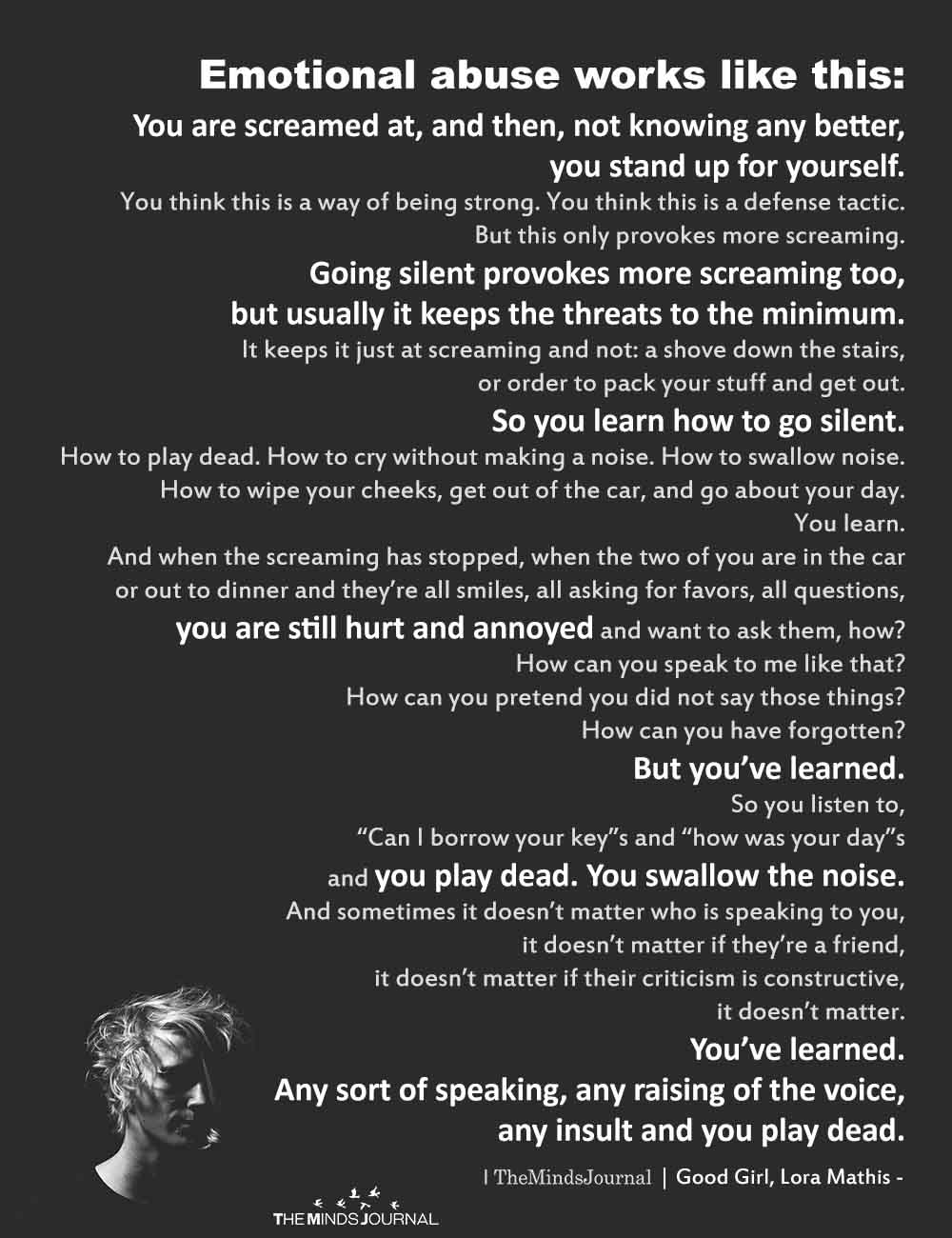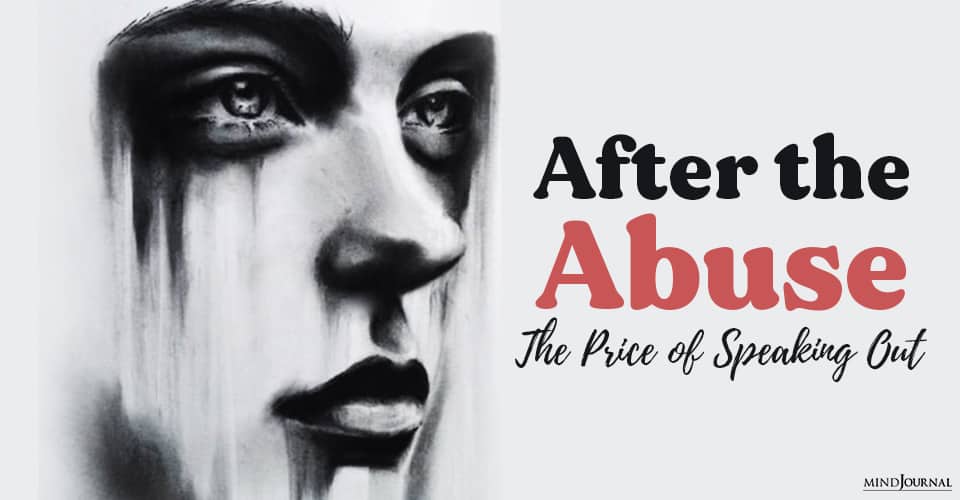A few months after abuse and escaping an emotionally abusive relationship, feeling strangled and suffocated by the enormity of that secret, I made a controversial choice: I wrote about what had happened on my Facebook page.
My confession was met with an outpouring of support, although I noticed the prominent silence of the friends my abuser and I had met as a couple. After I started writing articles about emotional abuse and the struggle of living with its consequences, more and more strangers started reaching out to me as fellow survivors.
Conversely, I got fewer and fewer responses from my friends and acquaintances; in fact, some ceased all interactions with me. I was experiencing first-hand what I had observed for a long time whenever someone finds the strength to reveal the abuse they’ve suffered:
Speaking out about abuse has its price.
An Uncomfortable Topic
It has got to be hard to read for those who have not lived it: I get the awkwardness of not knowing what to say. I get that friends and relatives feel powerless reading my story. There is nothing to say or do that can solve the problem. What comfort can possibly be offered? There are no magic words that can fix the long-lasting damage left by abuse, or make it easier to understand.
On a strictly practical level, talking about it is useless: I do not do it in order to find a fix, because there is none. I get that someone might therefore think there is no use in discussing it or analyzing it if it is not going to lead to any concrete results. For those who have been through it, that is not the case: there are one hundred facets to process, a hundred different consequences to face. It is a long, tortuous process that strains your mind every day.
At times you would like to keep repeating the same thing over and over again because then maybe, sooner or later you will find some meaning, an explanation, you will be able to accept the senseless cruelty that has been dealt with you for no discernible reason. You would like to scream it out until the whole indifferent world hears you, or even just to get it out of your bursting head. And, maybe, to make other survivors feel a bit less lonely.
Read In The Mind of an Abuser: “I Have The Right To Punish You”.
Dirty Laundry
There are some who disapprove of openly discussing experiences of abuse: the belief that dirty laundry should not be aired in public is hard to kill. Because it is unpleasant: because it makes people uncomfortable. Maybe some think it is just attention seeking. Maybe some, especially if they only know the charming side of the abuser, think it is “unfair” for the victim to speak out and ruin his scintillating reputation.
It is the same reason why I suffered his abuse in silence for months: to not make him look bad, to protect him, to be “fair”, and what was the result? That he kept behaving worse and worse, sure that nobody would find out, and I was alone in that horror, unable to ask anyone for help. Covering for my abuser out of love and politeness only enabled him to keep abusing me.
Read 6 Painful Ways Emotional Abuse Changes You
The Abuser’s Fan Club
There are those who knew us as a couple, and I get that it is going to be awkward and unpleasant for them. Maybe some do not believe me: after all, with them, he was always kind, generous, fun, the perfect drinking buddy. I remember how everyone adored him, especially the girls he worked so hard to impress.
Everyone trusted him – unbelievable how he could morph like a chameleon in a hundred different people to become everyone’s best friend; absolutely unbelievable how skilfully he could hide the monster he became in private – to the point that they could not believe the awful things he had done, not even confronted with hard evidence.
I get it: they were so absurd, so senseless that I could not believe them either, even after seeing the monster with my own eyes. For months I tore my brain apart trying to reconcile his two identities, the kind and lovely guy with the horrible things he did, trying to find a rational explanation. I did not manage. How can I expect someone who never experienced it to?
Read Unraveling PTSD after Narcissistic Abuse
“There are two sides to every story.”
Some might think I’m exaggerating, that they should hear his version – as if in the history of mankind there was ever an abuser who made a prompt and detailed admission of guilt. Do they really think that someone capable of behaving so horribly without ever any apology or remorse can tap into his non-existent conscience and admit it?
Of course, he never will. I already know his side of the story: it’s not true, he didn’t do anything, I’m a terrible person who wants to ruin his life; okay, so he might have “overreacted” a little but it was my fault anyway for pissing him off. According to him, his actions were perfectly acceptable and justified.
I do not know how someone who is objectively doing nothing wrong can deserve to live in terror, to be screamed at and insulted every day, constantly lied to and cheated on; but I understand how hard it is for normal people to imagine that someone might behave in such a horrible way for no reason whatsoever. It’s the same thought process that made me stay and be abused for months as I desperately tried to figure out what I was doing wrong to deserve it.
Months spent trying to behave “better” until I became his dog, his slave, always quiet and obedient. It was never enough to stop the abuse. But when he keeps repeating it’s your fault for making him angry, you end up believing it, and often everyone else believes it too. It’s the only vaguely logical explanation to be found.
Read 17 Signs We Are Used or Abused

“It’s none of my business.”
Maybe some believe me, but they decide it doesn’t matter anyway. They don’t want to take sides, they don’t want to get involved. He’s always been a cool guy to them, fun and entertaining: why should they give up someone who’s a positive presence in their lives because he hurt someone they don’t care about? I don’t have his ability to charm, entertain, and build an adoring fan club everywhere I go: I don’t devote all my energies to conquer every stranger I meet.
It’s typical of abusers, both to satisfy their narcissism and to make sure people won’t believe the victim. So what if it’s all fake? They will never see the monster: I’m nobody, I’m not their sister, so what does it matter what he did to me?
These are good people, outspoken and sensitive to political and social injustice, often calling to action on important issues: I’m sure they would all condemn domestic violence from a comfortable distance. But when the problem hits too close to home – when the abuser turns out to be their friend, their drinking buddy, the fun guy they chat with on Facebook – then things get uncomfortable, and it’s easier to simply look the other way.
It’s easier to stand up to non-specified, easily identifiable “bad guys” who supposedly come with clear warnings and labels. But no abuser is a stereotyped, cackling movie villain, and each one of them is surrounded by relatives and friends who similarly look the other way out of confusion, discomfort, disbelief.
They might think, “but I know him, he’s really not a bad guy”: and don’t understand, can’t even imagine that the victim knows him in ways they never will, and know exactly how bad he can really get.
An Uncomfortable Reality
Rape victims are routinely attacked, accused of being evil women who want to ruin those “good guys”’s lives; girls abused by relatives can be ostracised and silenced by their own families. When reality is painful and hard to accept, it can be easier to ignore the victim, to accuse her of lying – or to brutally punish her for having dared to speak out. It would have been easier for everyone if she’d just kept quiet, without bothering anyone.
Accepting the horrific fact that a loved one is a monster is too hard, uncomfortable, so people angrily reject reality to cling to the pretty illusion of a “normal life”. Trying to reconcile the good man they’ve known for years with the monster he turns into in private is so absurd that it can be impossible. It’s easier to attack the victim threatening their comfortable illusion, shutting her up and pretending nothing is wrong to safeguard their comfort.
I struggled with it for months, even though I myself was the victim: unable to accept that the monster was real, that the good man I’d fallen in love with didn’t exist, I hung in there in silence desperately trying to find an explanation, someone to blame… usually myself.
Read Why You Should Never Jump Into A New Relationship After Narcissistic Abuse
Speaking Out Anyway
Before I opened up about the abuse, I had taken into account that there might be consequences. I was terrified of what my abuser would do if he ever found out I’d talked. Maybe some people would get mad at me, call me a liar, a drama queen; maybe some would stop talking to me. But I decided to speak out anyway, and I do not regret it.
I know I’m telling the truth. I have no proof and no witnesses. Some people believe me: there’s nothing I can do to convince those who choose not to or those who for their own comfort simply decide to turn a blind eye.
But I’m not gonna stop speaking out. And if there are people who decide to shun me for it, so be it.










Leave a Reply